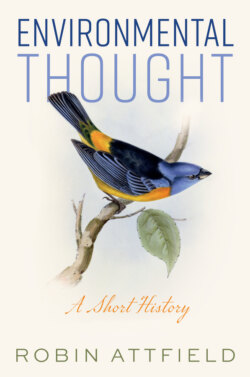Environmental Thought

Реклама. ООО «ЛитРес», ИНН: 7719571260.
Оглавление
Robin Attfield. Environmental Thought
CONTENTS
Guide
Pages
Environmental Thought. A Short History
Introduction
Recommended reading
1 Pre-modern Attitudes and Influences
Greeks and Romans
Hesiod and Virgil
Empedocles
Greek medicine: Hippocrates and ‘Airs, Waters, Places’
Plato and later Platonism
Aristotle and Theophrastus
Lucretius
Roman circuses and related protests
The Old and New Testaments and Early Christianity
The Old Testament
The New Testament and the Christian message
Early Christianity
The Middle Ages
Saints and beasts, monks and farming
Lynn White and medieval technology
The Rise of Islam
St Francis of Assisi (1182–1226)
Hildegard, Albert and Thomas Aquinas
Recommended reading
2 Early Modern Reflections. The Sixteenth, Seventeenth and Eighteenth Centuries
Luther, Calvin and Hale
The metaphysical poets
The scientific revolution: Bacon, Descartes and the Royal Society
The new world
The humanitarian movement
Classical economics and belief in progress
New forms of understanding
The Romantic Movement
New philosophies of nature
Overview
Recommended reading
3 Darwin and His Successors. Influences on Darwin
Darwin’s Argument
Darwin on Ecology
The First Darwinians, Humanity and Nature
Herbert Spencer and Social Darwinism
The Reception of Darwinism in the Nineteenth Century
Darwinism in the Twentieth Century
Recommended reading
4 The American Debate. The Transcendentalists
George Perkins Marsh: Regenerating the Earth after Human Disruption
Marsh and Darwin
John Muir, Yosemite and Preservation
Muir, Gifford Pinchot and Forests
Muir, Pinchot and the Hetch Hetchy Valley
American Humanitarians
Henry Salt Rediscovers Thoreau
Recommended reading
5 Foundations of the Science of Ecology. The Field that Haeckel Named
Pioneers, from Grisebach to Warming
Dynamic Ecology: Cowles and Clements
British Developments: Arthur Tansley and Charles Elton
Challenges to Clements: The Dust Bowl
The New Ecology and Eugene Odum
Some More Recent Work in Ecology
Recommended reading
6 Further Origins of Conservation
Gerard Manley Hopkins
Influences on Aldo Leopold and Some Early Stances
Leopold’s mature stance
Rachel Carson
Edward O. Wilson, Sociobiology and Biophilia
Two Television Personalities
Recommended reading
7 Early Environmentalism
‘Overpopulation’, Pollution and Parables
Barry Commoner’s The Closing Circle (1971)
A Blueprint for Survival (1972)
The Limits to Growth (1972)
Small Is Beautiful (1973)
René Dubos and Barbara Ward
Our Common Future and Its Aftermath
Recommended reading
8 Environmental Philosophy and Kindred Studies. The Birth of Environmental Philosophy
Individualism: Animal Welfare and Rights
Individualism in the Form of Biocentrism
Ecocentric and Holistic Ethics
The Ethics of Gaia
Environmental Virtue Ethics
Environmental Aesthetics
Recommended reading
9 Green Issues and Movements
Ecofeminism
Social Ecology and Bioregionalism
Ecological Restoration
Future Generations and Future Ethics
The Ethics of Biodiversity
Environmental Justice and the Environmental Justice Movement
Stewardship and Ecotheology
Green Political and Social Movements
The Earth Charter (2000)
Recommended reading
10 The Environmental Crisis
Pollution
Biodiversity Loss
Climate Change: Scientific and Ethical Issues
Climate Change: Schemes and Policies
Recommended reading
Conclusion
Recommended reading
References
Index. A
B
C
D
E
F
G
H
I
J
K
L
M
N
O
P
R
S
T
U
V
W
Y
Z
POLITY END USER LICENSE AGREEMENT
Отрывок из книги
Robin Attfield
There have been many different conceptions of nature across the centuries. For some, nature is everything that is not supernatural, and in this sense humanity is generally regarded as part of nature. For others, the natural is everything that is not (or largely not) the result of human artifice or intervention, and in this sense humanity is often regarded as distinct from nature, since most people are formed by human nurturing and education. The parenthetic ‘or largely not’ is important, for the regions of Earth unaffected by humanity are diminishingly slight, and in some views nonexistent. Yet whole tracts are largely unaffected, and it is these tracts and their living inhabitants that are most often meant when people speak of ‘nature’.
.....
Paul, for his part, was clear that the whole of creation was involved in God’s plan of salvation, ‘groaning in travail’ and yearning for its fulfilment (Romans 8:19–22). And the author of Revelation foresees that in the last days there will be a tree of life, the leaves of which ‘are for the healing of the nations’ (Revelation 22:2). Glacken (1967: 163) regards the passage of Romans just mentioned as far more representative of Paul’s thinking than passages later interpreted as concerning sin being inherited from Adam, the first human. The Bible, then, regards nature as both God’s creation and as being involved in his plan for redemption.
Lynn White (1967) has claimed that Christianity is ‘the most anthropocentric religion the world has seen’. ‘Anthropocentrism’ is variously used to mean either the view that everything exists for the sake of human interests (teleological anthropocentrism), or the view that the criterion of moral rightness is fostering human interests alone (normative anthropocentrism). White may intend both of these, but qualifies his claim with ‘in its Western form’, thus referring in the first instance to two millennia of Christianity in the West. However, it is appropriate to remark at this stage that, despite occasional anthropocentric biblical passages (e.g., Paul’s stance on oxen at 1 Corinthians 9:9), the Old Testament is clearly incompatible with anthropocentrism in both of these senses (see Psalm 104, Proverbs 12:10 and Job 38–41), and that the overall message of the New Testament is, in this regard, no different. I will, however, return to White’s claims in the section below on the Middle Ages, to which they most directly refer.
.....